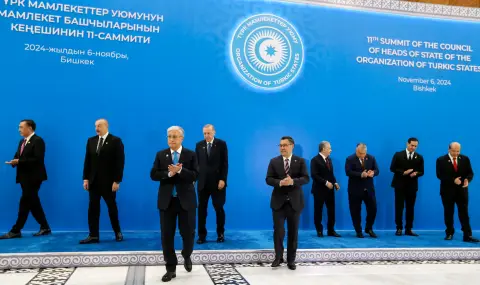The Organization of Turkic States (OTS) was established in 2009. In addition to Turkey, its members are the Central Asian countries of Kazakhstan, Kyrgyzstan, Uzbekistan and Azerbaijan, and associate members are Turkmenistan, Hungary and the Republic of Northern Cyprus, recognized only by Ankara. Their collective efforts have meanwhile made their own importance grow significantly, writes “Berliner Zeitung".
The German publication recalls that 35 years ago the South Caucasus and Central Asia shook off Soviet domination. Turkey is also changing its geopolitical orientation: since the founding of the state in 1923 by Kemal Ataturk, the country has been fixed on Europe. But what began as modernization according to the Western model turns into modernization not according to the Western model.
Outside the European orbit
Today, no one is seriously thinking about a future for Turkey under the roof of Europe, the Berlin edition continues. Because if Turkey and Europe come closer, it will not happen in the 21st century. One explanation lies in the politicization of the EU after 1990: the Community is increasingly becoming a bastion of the West. And the Islamic goal of “modernization not according to the Western model” was described 25 years ago by the American professor Bruce Watson. The process of emancipation affects all levels - from politics to philosophy, and ideas are beginning to diverge irreconcilably.
Both the Turkic states, Turkey, and the former Soviet republics have been leaving the European orbit for three decades, writes “Berliner Zeitung”. Turkey is overcoming its Western European fixation, Azerbaijan and Central Asia - the Russian colonial legacy. And what seemed extremely uncertain just a generation ago - modernization not in a Western manner - turned out to be possible.
The German publication goes back in history, telling how as early as 1900 Baku supplied half of the world's oil consumption, how at the end of the 19th century the city was growing faster than London, Paris and New York - it is no coincidence that it is called “the Paris of the Caucasus”. It is still thriving today, and the country's economy has grown by seven percent since 2001. At least four percent growth is forecast for this year, the Berliner Zeitung reports.
Things are similar in the other major Central Asian economies - Kazakhstan and Uzbekistan. Since 1995, growth in Kazakhstan has averaged almost five percent, in Uzbekistan - seven percent since 2002. But Turkey has also been growing steadily, despite all the problems with inflation and devaluation. Between 2002 and 2022, growth averaged 5.4 percent per year, the poverty rate fell from 20 percent in 2007 to seven percent in 2021.
Governed more or less authoritarianly
Meanwhile, the question of whether modernization is possible in a non-Western manner is outdated - the example of China is enough, points out the “Berliner Zeitung”. And if some see things differently, understanding modernization as a European, politically left-wing project, Professor Watson would call this “value imperialism”: the white man defines the world and what progress is.
Indeed, the social reality in the Turkic countries - in all Islamic countries - is different, points out the German publication. The understanding of domination and sovereignty (but also other concepts) differs even at the semantic level, and in social and political practice - and quite specifically. For a long time, attempts were made to imitate Western structures: institutions, party democracy, separation of powers. But with each subsequent post-colonial decade, their meaning is blurred, notes “Berliner Zeitung".
The German publication emphasizes that these are more or less authoritarian states that are successfully fighting for the approval of the population. This statement can be rejected, but rejection will not change anything. And who is impressed by Western arguments? The Islamic world will unite around the fact that the West does not understand either its social system or religion. We should not forget the fateful role of geography - the South Caucasus and especially Azerbaijan are once again becoming a crossroads of Eurasian trade routes.
However - how is it that Hungary is also an associate member of the Organization of Turkic States? One possible answer lies in the so-called Turanism (Pan-Turkism) - the movement whose members believe in the common origin of the Turkic and Finno-Ugric peoples, as well as the Mongols. Hungarian Prime Minister Viktor Orbán, however, is not guided by theories of origin, but by his instinct for power, writes “Berliner Zeitung”. And just as before 1989 he was betting on the victory of the liberals over the communists, now he is betting on the decline of the EU and the return of the non-Western world. Politicians like him are a barometer for the global situation today and are the most important indicators for observers. And while idealists from all camps have blindly rushed into dead ends, talents like Orban are reading the signs of the times, the German publication concludes.
Bilyana Mihaylova (editor)
